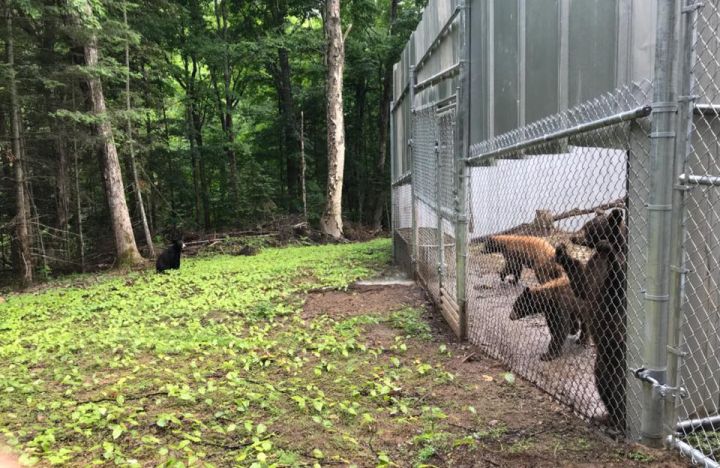Update: Parks Canada confirmed the bears were returned to the backcountry of Banff National Park on Tuesday, July 17.

Three bear cubs that were found trapped in a bathroom in Banff National Park last year are set to return to Alberta.
The black bears, which were found in the Banff facilities by a passerby in April 2017, have spent the past 15 months at a wildlife sanctuary in Ontario.
The managing director of the Aspen Valley Wildlife Sanctuary said it’s hoped the bears will make the journey back west sometime this month. Howard Smith said the exact date will depend on weather conditions on both ends of the trip.
“The parks folks are working on that,” Smith said Wednesday. “If we’re in the middle of a heavy heat wave, we won’t be able to move them out. But we’re hoping it’ll take place at some point this month.
“They’ll be flown out, which is the shortest and quickest way to get them back. Hopefully we don’t have to tranquilize them here; we have transfer crates that have been specially made for them that satisfy aircraft transportation requirements.”
Each bear will have its own crate with water, Smith said, adding they are large enough for the animals to walk around.
“They’ll be placed in those and taken to where they’ll be flying out. On the other end, the parks people will take over and take them to where they’re going to be released.”
Smith said the bears will be released in the mountains in Banff National Park.
Parks Canada said a timeline for bears’ return has not yet been confirmed.
“Parks Canada is working to develop a plan that will minimize stress for these animals and ensure they have the best chances of survival when they are returned to the mountain national parks,” Parks Canada spokesperson Christie Thomson said in a statement.
The cubs were found on April 1, 2017 at the west washroom at the Vermilion Lakes pull-off, about three kilometres west of the western entrance to the town of Banff off the TransCanada Highway.
The unlikely trio was discovered by a man who was driving by and made a pit stop to use the facilities.
At the time, an official with Banff National Park estimated the cubs were roughly three months old and weighed between four to six pounds each.
During their time at the Ontario sanctuary, the bears have grown to be about 100 pounds each, Smith said.
“They have been growing well all through the period that they’ve been here,” he said.
The bears hibernated well over the winter and emerged from their den in mid-April.
“Since then we’ve been feeding them up to try to get their weights up to get them ready to head back to the mountain landscape,” Smith said. “We’ve tried to sort of put a little more weight on them because it’ll be a transition for them back into the natural landscape.”
When the bears first arrived at the sanctuary, they were bottle fed. There was human contact with a caregiver, but Smith explained the person wore a gown and mask that was covered in bear scent from other bears they’ve rehabilitated in hopes of minimizing human influence as much as possible. That’s the approach staff took over the past 15 months, he said.
Watch below: Parks Canada is investigating after three black bear cubs were found in a Banff National Park restroom, without their mother

Once the bears moved on to solid food, they were placed in an enclosure that’s in an isolated part of the 470-acre property. Part of their diet included plant species from Alberta that the bears would encounter in their normal environment.
“We would feed them from a scaffold on the outside of the enclosure, which has a solid wall. So the food would be thrown over, again, trying to minimize any associations between where the food was coming from and between bears and people,” Smith said.
“The food would just be on the ground when they were looking for it. So we were not putting bowls in and doing that sort of thing to feed them or water them. As well, they were not encouraged in any way to approach the people. We tried to maintain a wild situation for them and they are behaving sort of that way now — same as any other bears we’ve rehabbed.”
Smith said concerns have been raised about how well the bears will be able to transition back into their natural habitat. He said the sanctuary has worked with other black bears and have had no issues with the transition.
“We’ve had experience with other black bears in this regard and things have gone well. Over the years we haven’t had any come back. I know that was one of the concerns that people have is that if they’ve been rehabbed somehow they’re going to be more accustomed to people and therefore be more of a problem when they’re released back in the wild and the science has shown that not to be the case,” he said.
“They’re no more likely to become a problem than any other wild bear.”
Smith said once the bears are released, they will be tracked with GPS collars.
Watch below: Aspen Valley Wildlife Sanctuary managing director Howard Smith joins Global News Morning Calgary with details on how the three orphaned bears are doing ahead of their homecoming scheduled for July.



Comments